February 14, 2012
Edited by David Sanders
Specimen Days
February 14, 2012
1881 – William John Gruffydd, Welsh poet/scholar (Ynys yr Hud), is born.
1884 – Kostas Varnalis, Greek poet (d. 1974), is born.
1909 – A Moses Klein, Montreal, poet (Hath Not a Jew…), is born.
1913 – Ab [Albert] Visser, Dutch poet/writer (Man Without a Head), is born.
 One of these days I shall go up to the second terrace
One of these days I shall go up to the second terrace
to see if it still is there—
the uncomfortable sentimental bench
where, — as we listened to the brass of the band concerts
made soft and to our mood by dark and distance—
I told the girl I loved
I loved her.
—from “The Mountain” by A. M. Klein (1909–1972)
Poetry In The News
A Century of “Poetry”
Happy birthday Poetry magazine! One hundred years ago, Chicago poet and patron of the arts Harriet Monroe founded Poetry magazine. In 1912, she wrote, “In the huge democracy of our age, no interest is too slight to have an organ. Every sport, every little industry requires its own corner, its own voice that it may find friends, greet them, welcome them.” Well, the magazine certainly found friends over the years–and one of them was philanthropist Ruth Lily, who gave the magazine $200 million, which gave birth to the Poetry Foundation. But 100 years later, where does poetry fit in society during this digital age? Eight Forty-Eight gets some help answering that questions from Poetry’s editor Christian Wyman. Read more at WBEZ.
Poetry in Motion
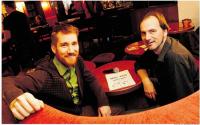 It’s a bird! It’s a plane! No, that object you may have seen floating over downtown Ottawa Saturday night was … a poem? You don’t often see a poem floating through the sky (I’ve never seen one, but I don’t get out much). The flying poem on Saturday night was launched during a fundraising event for Versefest, the now annual festival of all things poetry in the city. People at the fundraiser at Arts Court were asked to write a poem about the end of the world — a sly nod to the Mayan prediction that 2012 is the year of the apocalypse — and the winning poem was lacquered, attached to a weather balloon and sent off “to the world,” says Dave O’Meara, an Ottawa poet and one of the directors of Versefest. Read more at the Million’s Poet, the Arab World most popular TV program, premiered earlier this month from Shati Al Raha Auditorium in Abu Dhabi. The show, in its fifth session, is organised and sponsored by the Abu Dhabi Authority for Culture and Heritage (ADACH). As expected, this season’s contestants chose to highlight the region’s unstable political situations, and, more importantly, to see how the region reacts to them. Million’s Poet competition is serving as a platform, where political opinions concerning the big changes the Arab region has been witnessing recently, can be expressed freely. Read more at the Middle East Online.
It’s a bird! It’s a plane! No, that object you may have seen floating over downtown Ottawa Saturday night was … a poem? You don’t often see a poem floating through the sky (I’ve never seen one, but I don’t get out much). The flying poem on Saturday night was launched during a fundraising event for Versefest, the now annual festival of all things poetry in the city. People at the fundraiser at Arts Court were asked to write a poem about the end of the world — a sly nod to the Mayan prediction that 2012 is the year of the apocalypse — and the winning poem was lacquered, attached to a weather balloon and sent off “to the world,” says Dave O’Meara, an Ottawa poet and one of the directors of Versefest. Read more at the Million’s Poet, the Arab World most popular TV program, premiered earlier this month from Shati Al Raha Auditorium in Abu Dhabi. The show, in its fifth session, is organised and sponsored by the Abu Dhabi Authority for Culture and Heritage (ADACH). As expected, this season’s contestants chose to highlight the region’s unstable political situations, and, more importantly, to see how the region reacts to them. Million’s Poet competition is serving as a platform, where political opinions concerning the big changes the Arab region has been witnessing recently, can be expressed freely. Read more at the Middle East Online.
Malabo Blues: A Poet’s Challenge to Preserve a City
Cesar Mba Abogo is a poet with two huge ambitions — to use his work to preserve for future generations the image of a city that is being transformed at a blinding speed, and to build the first book shop in Equatorial Guinea. The relatively unknown Spanish-speaking country off the west coast of central Africa used to be one of the poorest in the region but has been going through enormous changes since oil was discovered in the mid-1990s. Read more at BBC News.
New Books
Animal Eye by Paisley Rekdal
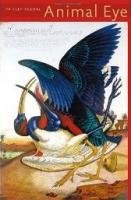 [Paperback] University of Pittsburgh Press, 96 pp., $15.95
[Paperback] University of Pittsburgh Press, 96 pp., $15.95
“Paisley Rekdal’s quiet virtuosity with rhyme and cadence, her syntactic fidelity to thought and sensation, her analytical intelligence that keeps homing in and in, her ambitious sentences and larger formal structures that try to embody with absolute accuracy the difference between what we ought to feel and what we really do feel—all these make her unique in her generation: no one sounds like she does, and her concern about the ‘post’ in postconfessional is as much a sign of her earnest desire to honor every aspect of her art, as it is an anxiety that spurs her restless investigations of family, selfhood, racial identity, and erotic life.”
—Tom Sleigh
In the Kingdom of the Sea Monkeys: Poems by Campbell McGrath
[Paperback] Ecco 128 pp., $14.99
After nearly a decade, In the Kingdom of the Sea Monkeys marks a return for Campbell McGrath to the poetic forms that brought him national acclaim—lyrical meditations on American art and society by turns satirical, tender, and haunted by the merciless work of time. In poems such as “Dick Cheney Speaks to Me in a Dream” and “Shopping for Pomegranates at Wal-Mart on New Year’s Day,” McGrath explores the intersection of the personal and the public realms of American culture like no other poet at work today. Whether he’s documenting the decay and transformation of American cities, eulogizing Allen Ginsberg and Frank O’Hara, or rhapsodizing on the extramortal lifespan of books, McGrath writes poems of dazzling energy, intelligence, humor, and engagement. In the Kingdom of the Sea Monkeys is a collection of dreams, visions, jibes, essays, arguments, and love songs, each of them transformed into poetry by one of our most honored and entertaining poets.
Just Look at the Dancers: Canticles, Fumes, Monostichs by Christopher Middleton
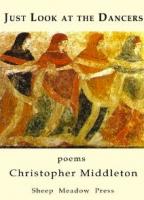 [Paperback] Sheep Meadow, 144 pp., $15.95
[Paperback] Sheep Meadow, 144 pp., $15.95
“Our language has not enjoyed the work of a poet so religious, without the consolations of convention, since the death of Wallace Stevens.” —Harvard Review
Secure the Shadow: Poems by Claudia Emerson
[Paperback] Louisiana State University Press, 80 pp., $18.95
Daringly realistic and artfully mediated by past and present, Claudia Emerson’s Secure the Shadow contains historical pieces as well as poems centering on the deaths of the poet’s brother and father. Emerson covers all aspects of the tragedies that, as Keats believed, contribute to our human collective of Soul-making, in which each death accrues into an immortal web of ongoing love and meaning for the living. Emerson’s unwavering gaze shows that loss cannot be eluded, but can be embraced in elegies as devastating as they are beautiful.
Recent Reviews
The City, Our City
by James Crews
The principal aim of The City, Our City, the latest poetry collection by Wayne Miller, is to construct a difficult, philosophical poetics that most audiences will have trouble wrestling into meaning. I have no problem with being pleasantly mystified or even confused (Lynn Emanuel’s latest work baffles me even as I gasp with wonder), but this book straddles a fine line between unsettling readers and completely turning them off. Since Miller’s previous volumes, especially The Book of Props, have won praise from many circles (including The New Yorker), perhaps he need not worry about losing readers; his audience may well be confined to those in the academy. And after all, The City, Our City does still showcase the poet’s remarkable skill, though it should be noted that his most successful poems establish a scene and context in which his talent begins to shine. Read more at New Pages.
Migratory Vernaculars
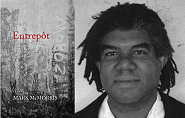 by Matthew Gagnon
by Matthew Gagnon
Once, we were told by word of mouth that Heraclitus of Ephesus spoke of a grotesque kind of order whereby he declared that: “War is the father of all and king of all, who manifested some as gods and some as men, who made some slaves and some freemen.” Rather than deploring the inequities of the world, he suggests that perpetual conflict is a way of life; it gives us meaning, much as our own history of recent memory has been shadowed by the thrust and force of war’s traumas. In Mark McMorris’s new book of poems, Entrepôt, we confront a like darkness where “The melodious waves / of grass promise no sanctuary / except to the beetle and cicada.” Read more at Jacket 2.
Raw Material by Derek Mahon
by Aingeal Clare
Poetry is what is gained in translation, wrote Joseph Brodsky, invertingRobert Frost’s more pessimistic view. It can happen: Edgar Allan Poe’s poems are notably improved in Baudelaire’s French versions and, hailing Christopher Logue’s Patrocleia, Henry Miller complained “If only Homer were anywhere near as good.” While it would be excessive to claim that Rilke or Neruda are improved in Derek Mahon’s English, a translation by Mahon is still an exciting event. In a version of Rimbaud’s “Ma Bohème”, Mahon writes: “Crashing at night in quiet country places / I’d versify among fantastic shadows”; his choice of familiar shades certainly makes for good company. Mahon’s love of the French 19th century is well established, but there are numerous welcome surprises in the poets assembled here, including a section from the Chinese, some Pushkin, Ibsen and Quevedo, and a scattering of Congolese poets. Read more at the Guardian.
The Rock Steady Voice of a Former Maine Poet Laureate
by Dana Wilde
Baron Wormser has been possibly the steadiest voice we’ve had over the last 30 years of poetry in Maine. He lives in Vermont now, but served as Maine poet laureate from 2000 to 2005, and for a long time, starting in the 1970s, lived a sort of back-to-the-land life in western Maine as a school librarian and encourager of creative activity. Time and space change, but not the voice, it seems. “Impenitent Notes” is the eighth and latest book-length entry of his ruminatory, incisive, somber-rhythmed, character-driven, ironic verse. Red more at Bangor Daily News.
Correspondences
Poetic Journeys: A Conversation with Nathalie Handal
 by Kaitlin Bankston
by Kaitlin Bankston
In this exclusive WLT interview, poet Nathalie Handal talks about her new verse collection, the distinction between homeland and home, and her sources of strength. Poet in Andalucía is forthcoming from the University of Pittsburgh Press in January 2012.
Kaitlin Bankston: In your new collection, Poet in Andalucía, you re-create Federico García Lorca’s journey, Poet in New York, but in reverse. What about Lorca and his travels inspired you? Do you see a part of him in yourself?
Nathalie Handal: I see myself in the landscape Lorca was from. I wanted to go back to the region where I heard convivencia or “coexistence” once existed—where Christians, Jews, and Muslims lived in relative harmony in Islamic Spain. And that desire amplified as the Arab-Israeli conflict worsened. Read more at World Literature Today.
Living Legends: An Interview With the Incomparable Nikki Giovanni
by Matthew Lynch
The second installment of “Living Legends” features one of America’s foremost poets and intellectuals, Nikki Giovanni. Her literary works investigate a plethora of topics, from jazz to racism and are extremely individualized messages conveyed through a range of emotions. Her folksy manner makes her poetry accessible to the masses. In 1968, she became an assistant professor of black studies at Queens College and has taught at several other colleges and universities, most notably, Ohio State University and Rutgers University. Since 1987, she has been a professor at Virginia Tech. Read more at the Huffington Post.
Broadsides
Uruguyan Poet of the Day: Eduardo Milán
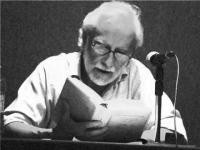 by Joyelle McSweeney
by Joyelle McSweeney
It is only fitting that we Montevidayans immerse ourselves in the writings of our brilliant semblables, our Uruguayan brothers and sisters, and to our very good luck Shearsman has recently published Hotel Lautréamont, a volume of contemporary Uruguayan poets edited by Kent Johnson and Robert Echavarren. I’m thrilled by this work and plan to write a few features on poets from this volume to help get the word out. I’ll start with Eduardo Milán, a poet I’ve wanted to know more about for a long time. Read more at Montevidayo.
Towards a Conceptual Lyric: From Content to Context
by Marjorie Perloff
Scene: The State Dining Room of the White House on the afternoon of 11 May 2011. Occasion: A poetry workshop held under the auspices of Michelle Obama for high school student-poets. The workshop has been organised by the First Lady’s close friend, the Yale poet-professor Elizabeth Alexander, who wrote the Inaugural Poem for Obama in 2008. . . . After Alexander makes a brief introduction about the powers of poetry, Melody Barnes, the President’s Domestic Policy Adviser, discusses the importance of the arts – poetry, dance, country music, Motown hits – for young people, stressing the fact that those schools that incorporate the arts into their regular curriculum (English, maths, science) get a better yield of ‘successful’ students. She then introduces the first poet, Tiesha Hines, a senior at Ballou High School in Washington, DC. Tiesha, we learn, ‘has been writing poetry since she was seven and is now president of her poetry club… After she graduates, she is going to get to use those skills in other ways, as she studies Criminal Justice at Fortis College and Trinity University’.4
Note the assumption here that poetic composition is a skill to be applied elsewhere. Read more at PN Review.
The Pursuit of Presence
by Micah Mattix
‘If I had to sum up in a sentence the impression Shakespeare makes upon me,” the poet Yves Bonnefoy wrote in an early essay, “I should say that, in his work, I see no opposition between the universal and the particular.” This is exactly the opposition that Mr. Bonnefoy—often lauded, and rightly so, as France’s greatest living poet—wishes to eliminate in his own work. From his first major book of poems, “On the Motion and Immobility of Douve” (1953), to his latest selection of poetry and prose, “Second Simplicity,” Mr. Bonnefoy has devoted himself to what he calls the universal “here” and the eternal “now,” to the impossible but hopeful pursuit of “presence.” Read more at the Wall Street Journal.
Drafts & Fragments
Bob Perelman Asks Donald Hall about His Relation to Modernism
How To Read Poetry
Envoi: Editor’s Notes
The Act of Creation: Poetry v Prose
by Jacqui Lipton
“Poets think that a household mess is picturesque – for them it’s the contemporary equivalent of a field of daffodils. The poets start the party and dance the longest, but they don’t know how to plug in the audio system, and they have to wait for the prose writers to show them where the on/off switch is. In general, poets do not know where the on/off switch is, anywhere in life. They are usually off unless they are forcibly turned on, and they stay on until they are taken to the emergency room, where they are medicated and turned off again.” —Charles Baxter, from Burning Down the House
Read more at madisonian.net.
My first response is, “So, what’s your point?” But after a little time, I settle down and recognize that whatever truth there is in Baxer’s assessment is primarily applicable to the callowness of youth much more than to a particular calling and doesn’t apply to those who, years later, end up as poets, either in thought or in deed— those who commit to the erratic slog, those who are in it not for the small rewards of local notoriety, but who instead take up poetry because it’s what they’ve been given. Like other craftsmen, poets fold their calling into their lives. They might end up as teachers, publishers, financial advisers, sales reps, librarians, or really anything which provides them a few minutes or hours to attend to their words in between the pulse of the rest of their lives. It’s not that the luster fades. But rather, it is absorbed into the definition of who they are as people. Do they have the long vision of novelists? Perhaps not. I know that prose writers have an endurance of faith that keeps them at the table. But poets, at least the ones I know, have a penchant for coming back again and again to the same table, sometimes after long absences, without dreaming of that wide readership, but instead because the need to write poetry is greater than the inclination not to. And as for the matter of not knowing how to plug in the audio system: Ahhh—let’s just chalk that up to one fiction writer’s poetic license and let it go at that.
—David Sanders
